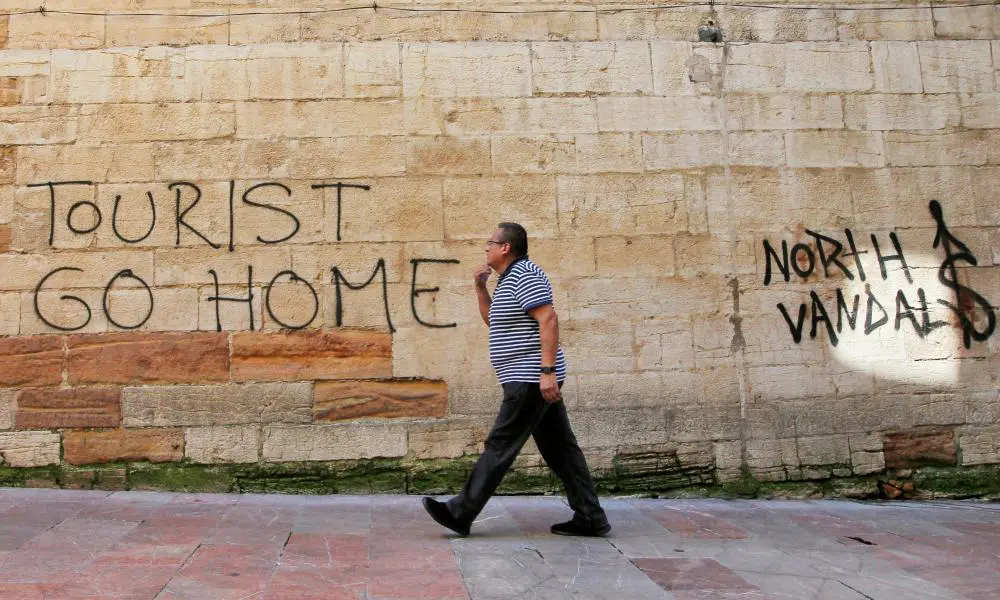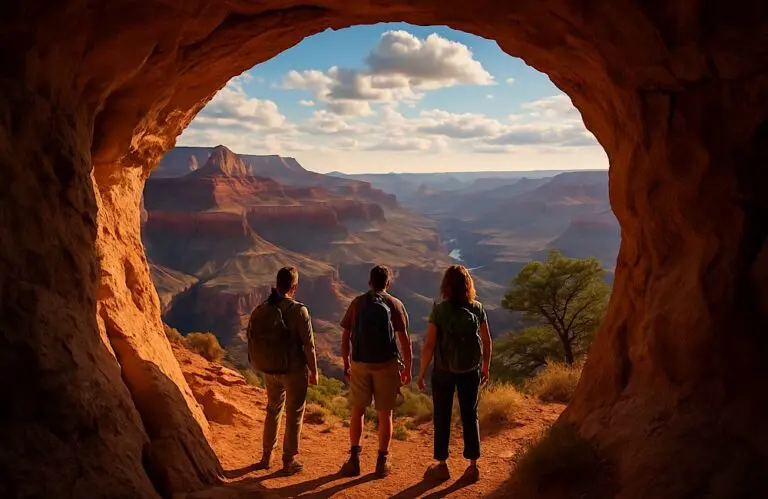The growing unrest and issues around anti-tourism in Europe are not exclusively about locals not wanting tourists to visit their homes and towns anymore, it’s what the visitors leave behind that’s more the issue.
Imagine for a moment that you lived in a place where every year, millions of people from all over the world descended upon your beloved community.
All year round, an increasing army of individuals and groups arrived on buses, in cars, taxis, planes, bikes and even on ships.
Overwhelming your neighbourhood, they choked up the local streets and the traffic and created long queues for services, disrupting your everyday routine and forcing you to endure lengthily delays.
These visitors showed no real understanding or respect for your culture, historical landmarks or heritage, feebly attempting to speak your language or interact with you or other locals.
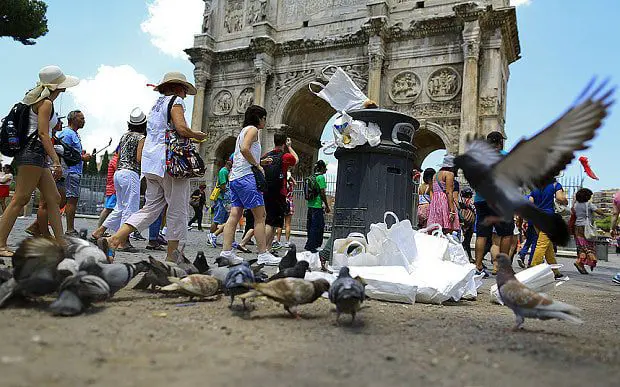
Rome’s infrastructure struggles to cope
Noisy, often rude and arrogant, the majority gave and spent very little and instead took advantage of your town or city’s already flimsy infrastructure, further carelessly eroding it, before leaving a wake of trash, pollution and all round bad sentiment in the place you love to call home.
Then you find that your rent has gone up significantly, or worse still the apartment block you live in is soon to be converted into Airbnb lets because the landlord can now make 40% more per year this way.
You try to find a cheaper place, but there are none you can afford and there is instead, now a housing crisis with residents being forced to move out of the town they perhaps have always lived.
HOW DO YOU THINK YOU WOULD FEEL ABOUT TOURISTS NOW?
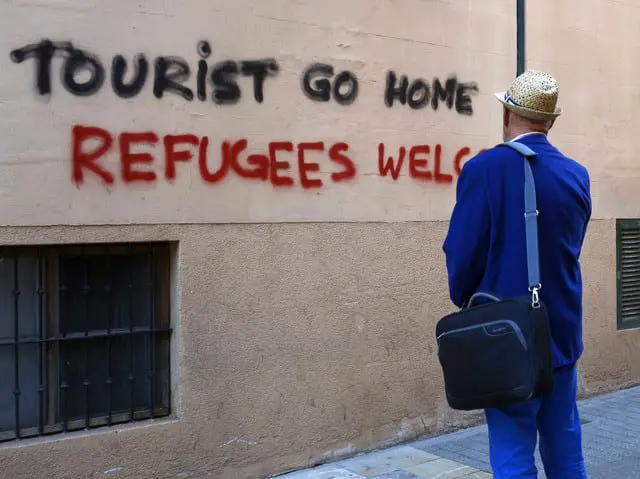
Murcia, Spain
Would you think that the graffiti (as above) recently seen in European cities such as; “Tourist you are the terrorist”, “Tourists go home”, “Tourism Kills Neighbourhoods” or “All tourists are bastards” is fair? Or harsh?
Do you think you’d feel frustrated about the situation? My guess is yes.
The recent public protests in Barcelona, Venice, Rome, Paris, Dubrovnik and a number of other European cities have further highlighted locals’ such plights against over tourism and at face value it looks ugly.
“The city has completely lost its identity… Everyone should be able to come here but this invasion creates real problems.”
Alessandro Bressanello, Mayor of Venice
In Spain for example in 2016, some 75.3 million people visited, massively outnumbering the country’s actual residents, of which there only are 46 million.
Barcelona itself incredibly sees around 32 million visitors a year, including cruise passengers and day-trippers. That’s an amazing 20 times the city’s actual population of 1.6 million and 8 million MORE than the entire population of Australia.
I REPEAT, that’s 32 million people and 8 million more than the entire population of Australia visiting Barcelona every year.
And counting.
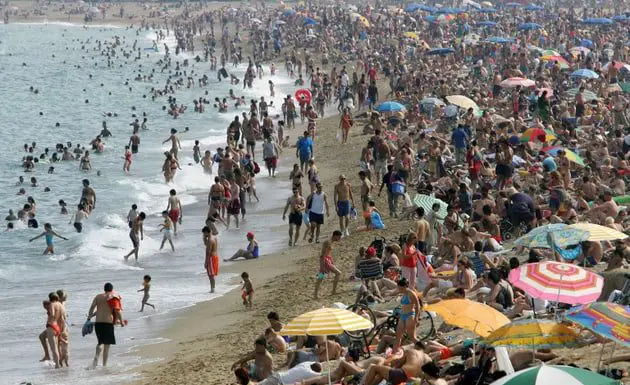
Barcelona
That alarming figure gives the issue some seriously worrying perspective.
Spain’s overall visitor numbers have in fact broken records consecutively for the last four years, making it the world’s third most popular tourist destination according to the UNWTO (United Nation’s World Tourism Organisation), ranking marginally behind the U.S. (75.6m) and France (82.6m).
The UNWTO’s response to over tourism says that the focus should not be, on simply stopping tourists arriving and instead recommends a number of proven methods for managing crowds in destinations, such as encouraging tourists to visit beyond the central sights, diversifying tourist activities, reducing seasonality and, importantly, addressing the needs of the local community.
So it’s no co-incidence that 2017 is UNWTO’s year of Sustainable Tourism, with the global body promoting #TravelEnjoyRespect as it’s main message.
Together we can change the world ???? ! Take the pledge to #TravelEnjoyRespect ! #IY2017 #WTD2017 ???? https://t.co/thy3DfEnuQ
— IYSTD2017 (@iystd2017) September 17, 2017
Clearly this is a highly complex problem and a growing global phenomenon, so will the messages like this one above be enough to change behaviour and transform the mindset of the millions of people travelling annually to other people’s homes?
It’s unlikely.
SO WHAT CAN WE AS THE TRAVEL INDUSTRY DO?

Paris. Photo: Pedro Lastra
As Travel specialists representing the wider travel industry in Australia and sending many travellers overseas to the regions mentioned above and beyond, it’s crucially important that we do so with the careful consideration of our customer’s impact in the destinations they visit.
It shouldn’t be about not sending customers to popular places, it’s more about educating people to literally tread carefully when they are there and make their own, well informed (by you) choices that will make a positive difference.
Perhaps you’ve never thought about it. “My customers have paid their money” you might think, “It’s not my problem. They can do what they want.”
But think again how you might feel if you were affected as a local? And of just how sustainable this all is. Not just for the locals mentioned above, but also for tourism itself for the long haul and the places you sell.
Here are three easy tips you can integrate into your sales banter today to do your bit AND add value to your customers trips.
1) CHOOSE YOUR SUPPLIERS WISELY
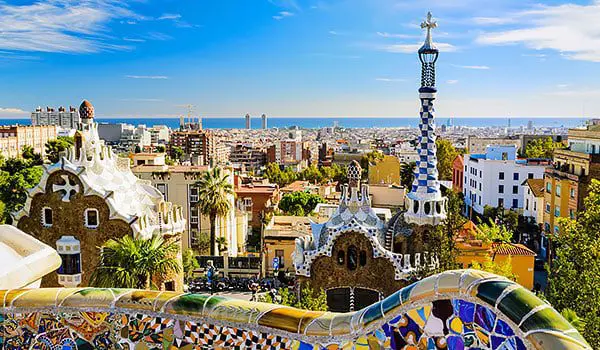
Barcelona
Where possible, work with supplier partners who you know tread carefully in the places they operate and engage the communities commercially to ensure all parties benefit sustainably.
The Travel Corporation’s Treadright Foundation features numerous sustainable projects that underpin every brand within the TTC family including Trafalgar Travel, Insight Vacations, Contiki and Uniworld.
The Intrepid Group also has its own Foundation that features a rich array of sustainable projects across all of its brands as well as G Adventures who have their own Planterra Foundation, operating a range of incredible initiatives globally.
Both Chimu Adventures and Buffalo Tours, whilst not operating in Europe, also proudly stand behind all their products and business as sustainable ones.
2) MINIMISE THE IMPACT
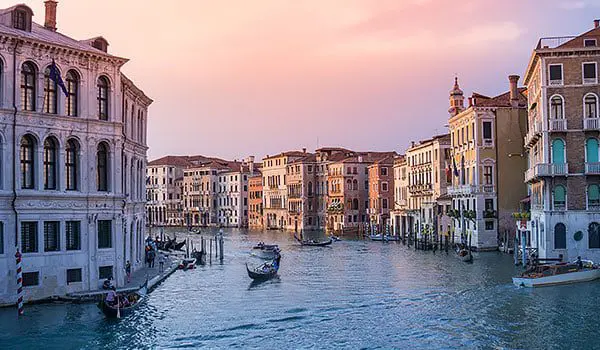
Venice. Photo: Rebe Adelaida
Give your customers helpful tips before they travel to minimise their impact on the places they visit.
It could be advising them to eat and shop locally (ie: at markets rather than supermarkets) in multiple places to share the love (and the money) around during their stay.
Urge them to take their own water bottles for example, rather than buying multiple plastic ones that will end up as landfill (maybe you could even give them your own branded ones?) and instead use public transport or bikes rather than taxis.
Taking shorter showers, making sure not to drop litter and actually smiling and engaging with locals?
It’s not exactly a big ask, but the positive outcomes are.
3) SHOWCASE YOUR CARE AND EXPERTISE
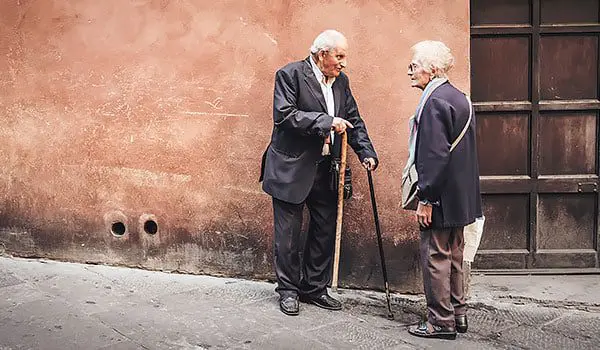
Lisbon, Portugal. Photo: Cristina Gottardi
Have your customers travelled to the countries or places you’re sending them before?
If not, give them some useful info to research, point them towards a phrase book (maybe you’ve created your own factsheet to give out) and outline the cultural no no’s and local issues.
Barcelona’s current challenges are a real issue. So don’t hide them, instead talk and educate your customers about the cities challenges and what they could do to help as part of their amazing holiday experience.
Everyone loves a positive story. So lean on your suppliers and re-tell the stories they’ve told you about all the great work they are doing in the destinations they visit.
This is your opportunity to prove (again) that you are a Travel expert who goes far beyond anything a booking website can offer. And you’ll be doing something good for everyone in the process.
Ultimately, this is your business and long term employment at stake and responsibility as a Travel Agent just as much as it is the people’s homes that you send your customers to visit.
All of us can play our part to help travel to change the world, which surely has to be a pretty good feeling.
READ: Gavin Tollman (Trafalgar CEO): Travel to change the world
READ: Katrina Barry (Contiki MD): Travel to change the world
READ: Bruce Poon Tip (Founder G Adventures): Travel to change the world


